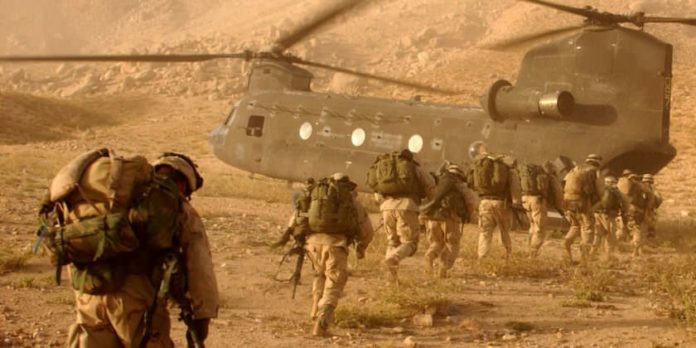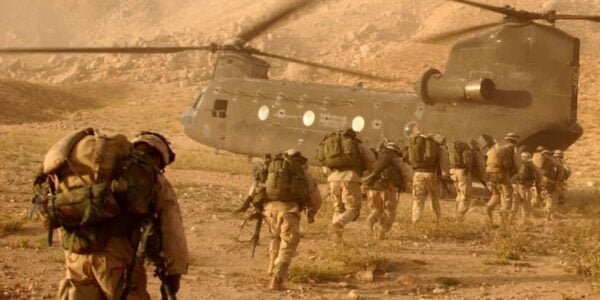My friend and mentor, Colonel W. Patrick Lang (USARMY Retired) participated in a debate in New York City eleven years ago on the proposition that the US could not win a war in Afghanistan based on the Obama Administration’s declared counterinsurgency strategy.
Pat is not an armchair warrior. Pat fought in Vietnam and then learned Arabic. Pat established the Arabic language program at West Point in 1976 and, along with his wife (also a skilled linguist), taught cadets for two years. Pat subsequently served as Defense Attache in Yemen and Saudi Arabia. His Arabic was flawless. But he wasn’t done serving his country. He was Chief of the Middle East Division at the Defense Intelligence Agency. For me, Pat is like E.F. Hutton–when he speaks you listen.
Here is the transcript of his opening remarks at the debate. It is tragic our leaders did not heed his warning back then.
Intelligence Squared Event,
New York University, New York City, October 12, 2009:
America Cannot And Will Not Succeed In Afghanistan/Pakistan
The Obama Administration has implemented a significant change in policy toward Afghanistan and Pakistan, which they view as a single challenge, AfPak. More troops and a new commander have been sent to Afghanistan, and the US has increased its level of support and aid to Pakistan. To many, this means we are becoming further entrenched in an open-ended quagmire where any military solution will ultimately fail. Others question whether we should care if Afghanistan has a strong central government or a democratic one. While most agree it should not become a terrorist haven, opinions differ on how this should be accomplished: more troops, covert operations, diplomacy? And what to make of Pakistan? We cannot allow its nuclear arsenal to fall into the hands of radicals, but President Obama has ruled out putting US troops on the ground. The task of rooting out al Qaeda and Taliban militants falls to Pakistan’s army, which has, until recently, supported these groups as a hedge against future conflict with India. How much tolerance does America have for the long road ahead with AfPak? Can we ever “win,” and how would we even define a win in this region?
For: Steven Clemons, Patrick Lang, Ralph Peters
Against: James Shinn, John Nagl, Steve Coll
Col. Patrick Lang – Opening statement
This is a fascinating topic at this particular moment in American history, and I would have thought, maybe that people were tired of it by now, but I can see that that is obviously not the case. As the chairman said, in fact, I don’t think you can decide that question other than in the context of whether or not of what American policy is and what the stated foreign policy of the President of the US is in regard to this question.
I had the fortune, or misfortune, to go to a number of Army service schools; one of them was the Army War College where they taught me a lot about what the strategy … the planning itself. You start with Mission, National Purpose, the Policy, and you devise a strategy from that and you implement that strategy. That’s how that works.
Now, last March, I listened carefully when President Obama announced that our policy in Afghanistan was to disrupt, destroy and disorganize our enemies, our specific enemies who were a danger to the United States. That’s a nice, clear policy. It’s not too hard to understand that
And to that end, Gen. Stanley McChrystal was put in command out there and was sent out to make what is called s Commander’s estimate of the situation. Which he did – with the help of various people for several months and it is now, as you know, the object of great contention in the Washington world. And the problem with his estimate, I think, that is causing so much trouble, is that it is normal in an estimate of that kind, for a commander to propose several options to his superiors, among which the boss can choose.
Presumably one option, in this case, the option of a large-scale counterinsurgency campaign across all the really hostile parts of Afghanistan in the context of their
ruined, if ever alive, economy, their obviously rather feeble political system, is a daunting task. Now, somehow it is now become, what we would call, an implied task for Gen. McChrystal that the pacification of large parts of Afghanistan in the most hostile premises are in fact a necessary thing. And for that reason, he has opted for a counterinsurgency.
I am happy to see so many members of my generation in the audience. There are usually too many young people for my taste. I started in the counterinsurgency business, in the Church of the Counterinsurgents, really, in 1964 if you can believe that. When the Army sent me down to Fort Bragg to study this subject with intensity at the feet of the most learned French and British exponents of this theory of warfare, which has been created as a result of the experience of former colonial powers after WWII in fighting against the wars of national liberation as they were called then.
And the Communists had gotten involved in all these wars, and we were against this as well. So we studied up on this in a big way. And one of the most interesting of the guys who taught from the stage there was a great scholar named Bernard Fall. Some of you undoubtedly know who that is.
And I remember watching him. I really had no idea who he was at the time. But I remember watching him write on the blackboard on the stage, Counterinsurgency = Political Reform + Economic Development + Counter-guerilla operations. And that is really all – really all of it in a nutshell.
And it is in that context that when you look at Afghanistan, this huge place, the size of Texas with 35 million people of very disparate origins, many of them speaking languages that are not mutually intelligible, and who, a lot of them don’t like each other very much, in fact, you can see that this is a very difficult thing to do.
We tried applying this theory of warfare, Counterinsurgency, across the world in the 1960s and 70s and 80s. I did it myself in South America, in East Africa, in Southwest Asia, and all kinds of places, and of course, Vietnam, how could I forget that. And we found that in places where the task wasn’t too big – the country wasn’t too big, the problems were manageable one way or another, or the people weren’t thoroughly converted to some ideology that demanded revolution, that you could do this, with enough good works and suppression of guerrillas. You could turn this around, and I could name places, if we had time.
In places that were really big, where none of those conditions apply, you could struggle like the devil, but you wouldn’t get very far. And this is the problem that I have with the idea of the application of counterinsurgency – those three things – to Afghanistan. In fact, I think it’s too big a task for us. We have been fighting for 8 years, Afghanistan is a huge place, it has terrible problems, economic ones, political ones, and the combat problem, from the point of view of a guy who fought in several wars like this, including Vietnam, is really very difficult.
And I would submit to you that, if what we’re going to do, as Gen. McChrystal says, is that we’re going to try to protect the people, which means essentially, Control the Population, because that’s what Counterinsurgency is about. Just like Insurgency by controlling the population by positive means, or some that is not so positive sometimes, you’re going to have to have a lot of troops to do this.
Gen. McChrystal evidently wants 40,000 more people; well, I would say to you that that’s just the beginning. That’s how we started in Vietnam too. This is a big problem we’re facing in Afghanistan, and in fact, this slice of the pie, will be followed by further slices of the pie. And my objection to all this, and the reason that I don’t think you can win with a counterinsurgency strategy is, in fact, because I think that three or four years down the pike, if we apply that strategy, all you good people and your fellow citizens across the country will ask, “Are the Taliban, or whatever it is that we’re calling the Taliban, are they really our enemies? In the sense that Al Qaeda was? Is this really what we want to do?”
And when that happens, and I suspect that what’s going to happen, is you’re going to tell your members of Congress that you’ve had enough of this, and they will vote for the end of the war as they did in Vietnam.
So, I don’t think we can do this. I don’t think we can do Counterinsurgency in Afghanistan. There are other methods that could be applied that would be able to control the situation over a long period of time. I don’t think we can withdraw altogether. But Counterinsurgency in Afghanistan, I find to be a very difficult idea.
Thank you very much.
Pat blogs at turcoplier.com. He also published his autobiography, Tattoo: A Memoir of Becoming.
I highly recommend it to you if you want to understand the development of a true warrior.
The post Colonel Patrick Lang’s Prescient Warning on Afghanistan appeared first on The Gateway Pundit.



